One of Scotland’s best, hidden gems and one of the most photogenic spots in the country lies just outside of the popular highland town of Fort William. At the end of the great Caledonian Canal, as the canal connects to the open water of Loch Linnhe, lies the longest staircase lock in Britain, the Neptunes Staircase.
If you are visiting Scotland, this is a stop you will definitely want to have on your itinerary and this guide to the Neptunes Staircase will ensure that you don’t miss out on one of Scotland’s most breathtaking spectacles. This short guide will tell you everything you need to know about the Neptunes Staircase and what you can expect.
Save this image to your Scotland Pinterest board for later!
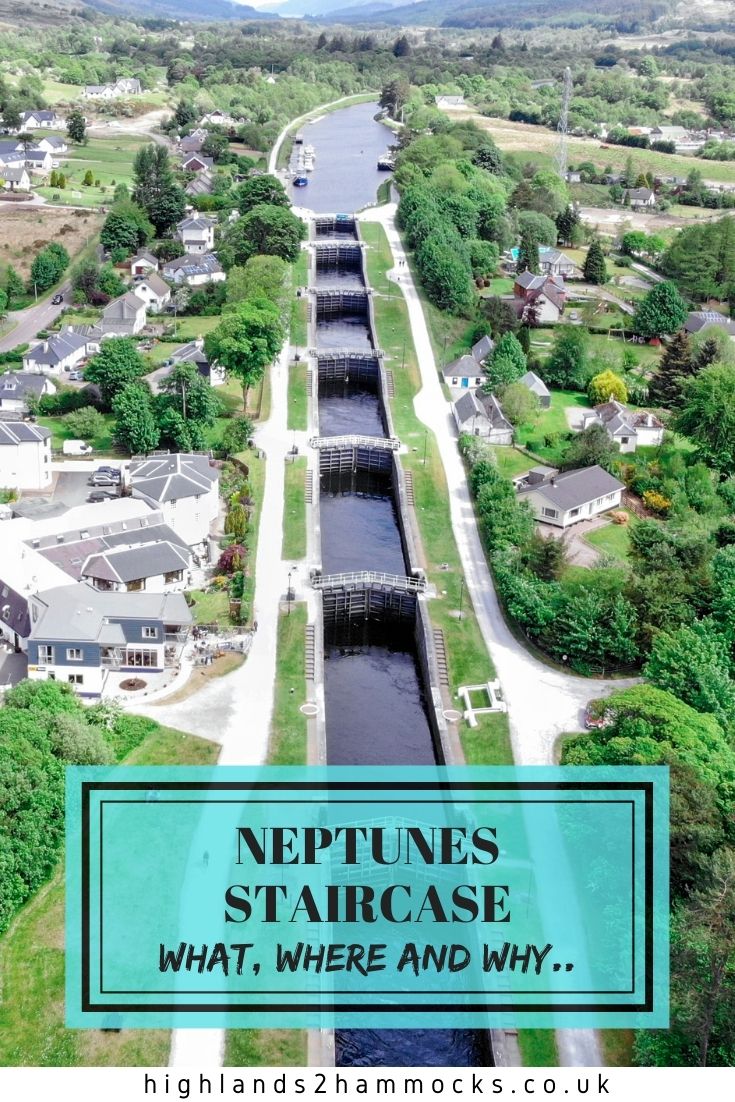
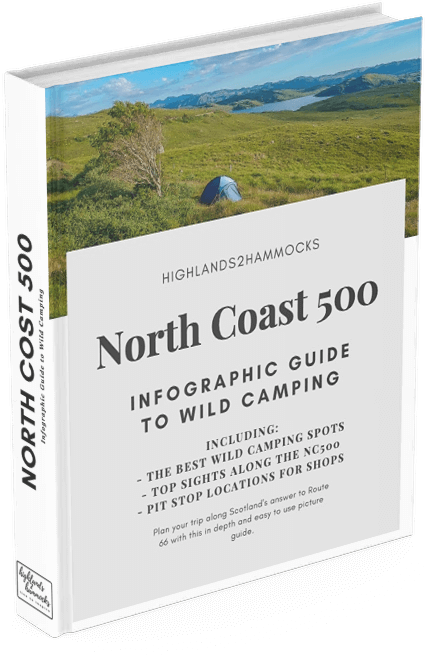
See Scotland’s beautiful countryside for yourself on our Best Road Trips in Scotland video. Make sure you subscribe to our Youtube channel for more by clicking here!
Complete Guide to the Neptunes Staircase, Scotland
Where is the Neptunes Staircase in Scotland?
Stretching from the northern city of Inverness to the southern city of Fort William is what is known as the Great Caledonian Canal. This body of water has been used to transport goods, weapons and citizens across the length of Scotland for the last 200 years.
At the southern end of the Caledonian Canal lies the manmade phenomenon, known as the Neptunes Staircase. This beautiful sight lies just outside of the town of Banavie, near to the northern hub of Fort William. It is a must-see attraction if you are planning a trip around the highlands of Scotland any time soon!
What is the Neptunes Staircase?
Stretching 500m along the Great Caledonian Canal there is a series of 8 locks that are known as the Neptunes Staircase. This manmade construction has been used to transport boats a massive 20m in elevation for over 200 years. Built between 1803 and 1822, the Neptunes Staircase is the longest staircase lock in the entire United Kingdom.
It takes a vessel a total of just 90-minutes to travel through all 8 locks, from the northbound Caledonian Canal to the beautiful shores of Loch Linnhe.
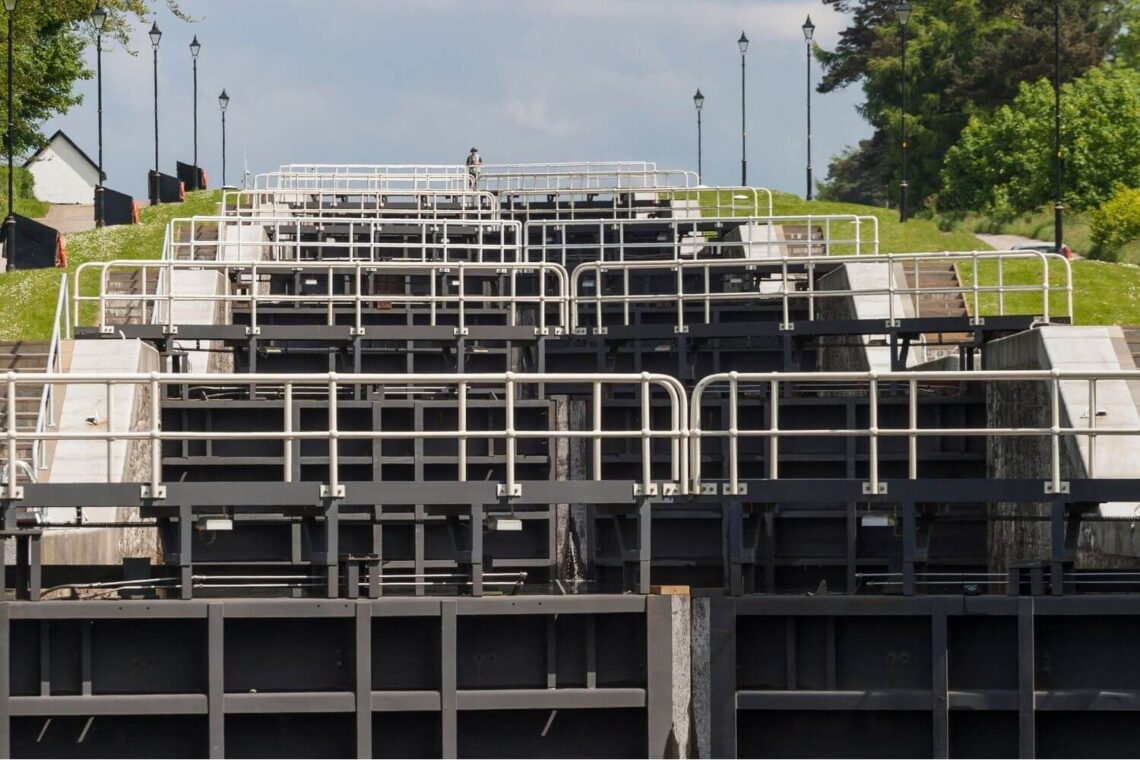
History of the Neptunes Staircase
Built-in the early 19th century, the Great Caledonian Canal was brought into being by the great engineer Thomes Telford with the hopes of stemming emigration from the highlands. The increase in waterway transport from the northern town of Inverness to the southern town of Fort William brought huge potential to the north of Scotland.
The series of locks began construction in 1803 and finished construction in 1822, using rock that was quarried from the nearby Corpach Moss. After completion, traffic through the canal grew steadily until an inn was required to house the passengers on the steamboats that travelled from Glasgow to Inverness along the canal.
Originally, the locks were opened and closed by sheer manpower, using capstans and the strength of the workers to move the huge gates. Each gate had two capstans, one to open the gate and one to close, each with four poles and requiring 7 turns to complete the task. This task would take such a long time that it would take a half a day for a boat to transfer along the Neptunes Staircase.
In 1962, the Caledonian Canal and the Neptunes Staircase was passed to the care of the British Waterways, who began to mechanise the function of the locks to make them more time-efficient. This process was completed in 1969 and the result was a short 90-minute journey along with 8 locks.
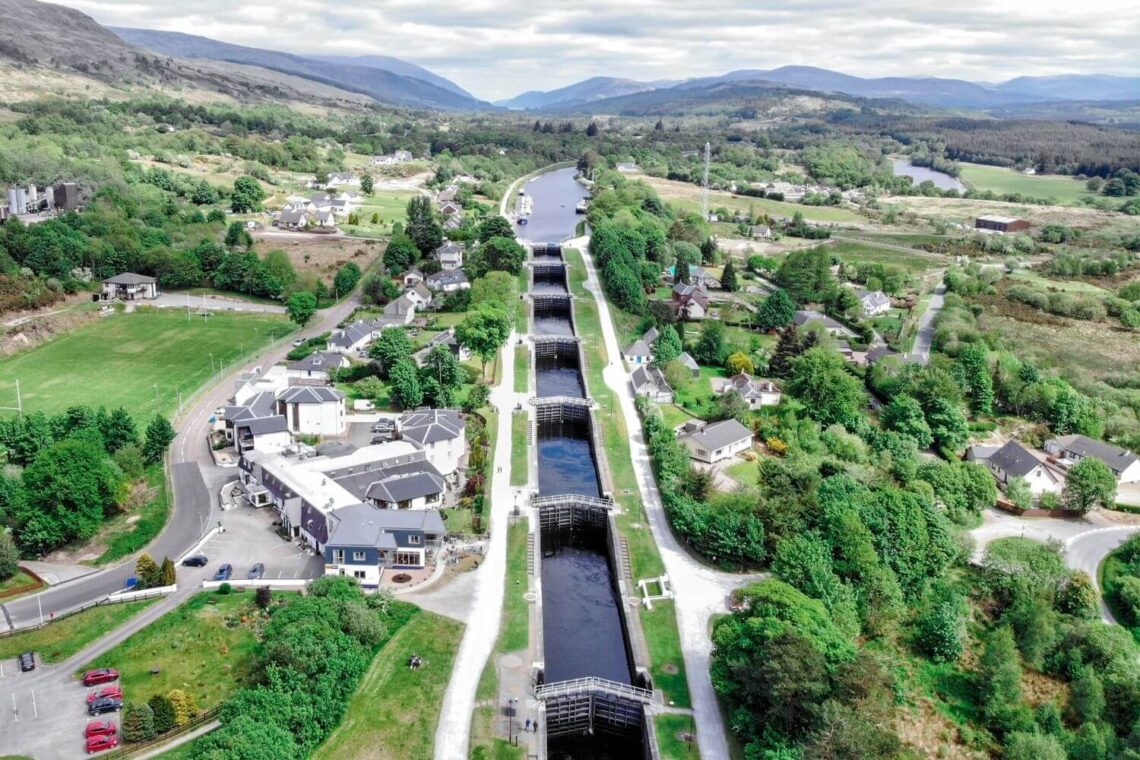
How to Get to the Neptunes Staircase?
Finding the Neptunes Staircase is a relatively easy affair as it lies just outside the town of Fort William and is well sign-posted. Heading north out of Fort William, continue along the A82 until you reach the roundabout by the ancient Ben Nevis Distillery. From this roundabout, if you turn left and follow the road along until you cross the second bridge, you will cross over the Great Caledonian Canal.
Take the first right after the second bridge and the road will lead you to the car park for the Neptunes Staircase. From here, the staircase locks are just a short walk up the hill to the left.
When is the Best Time to Visit the Neptunes Staircase?
When it comes to planning your trip to Scotland, trying to nail the right time of year to visit can be tricky. In general, the best months (in terms of dryness and lack of insects) tends to be from April to June, with the midges starting to come out as you get closer to summer.
School holidays also begin in the rest of the UK at the end of July, when the countryside in Scotland comes alive with tourists. We would highly suggest that you avoided visiting the highlands of Scotland at all cost within the periods of the school holidays, however, if you absolutely must tour Scotland then, we would suggest visiting as early as possible in the day.
By visiting these popular sights during the quieter periods you will not only protect the environment from overcrowding, but you will also be able to appreciate the true beauty of this landscape in peace and tranquillity. Admire the stillness of the nearby loch and watch out for wildlife playing in the water, and be prepared to fall deeply in love with the bonnie lands of Scotland.
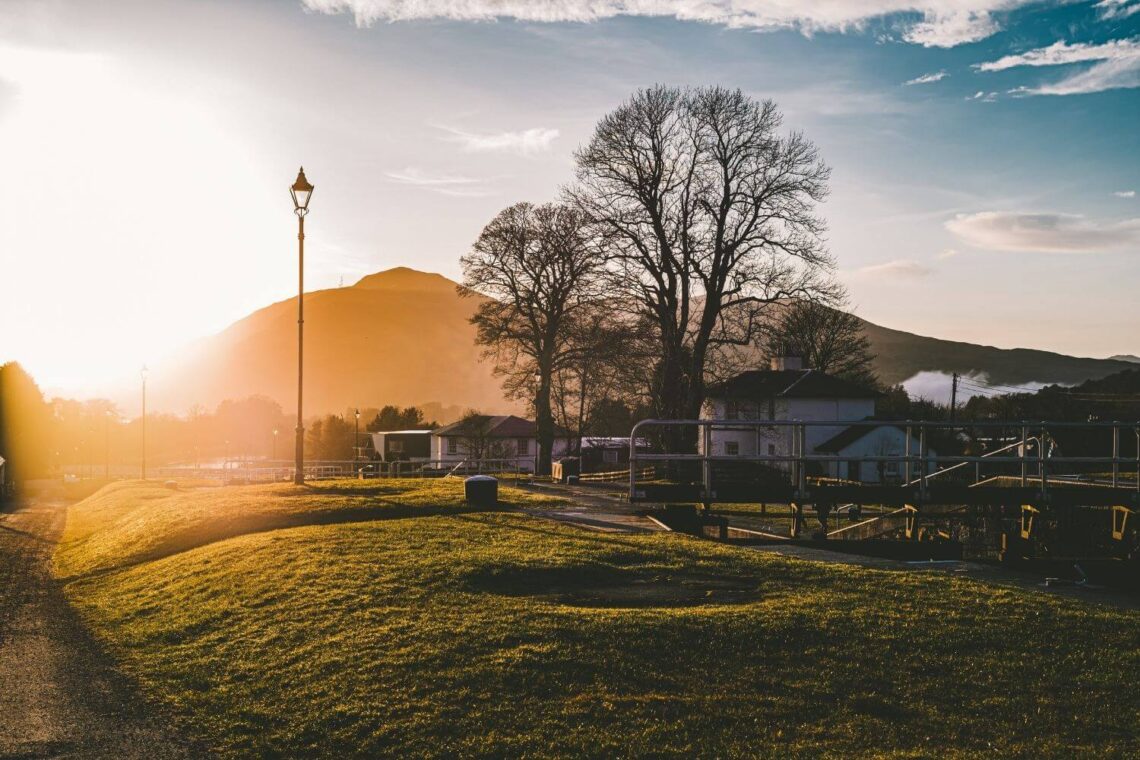
Other Activities Nearby the Neptunes Staircase
Corpach Shipwreck
Perched on the shores of Loch Linnhe is one of the more mysterious sights in the highlands of Scotland. In 2011, the MV Dayspring broke anchor and ran aground after a fierce storm swept through the area. Since then, what has become known as the Corpach Shipwreck has drawn photographers from far and near, all desperate to get a shot of this beautiful vessel with the towering peak of Ben Nevis in the background.
During your visit to Fort William, make sure you swing by the small town of Corpach and visit the Old Boat of Caol for a photo of your own.
Read more about the Corpach Shipwreck in our full guide over here.
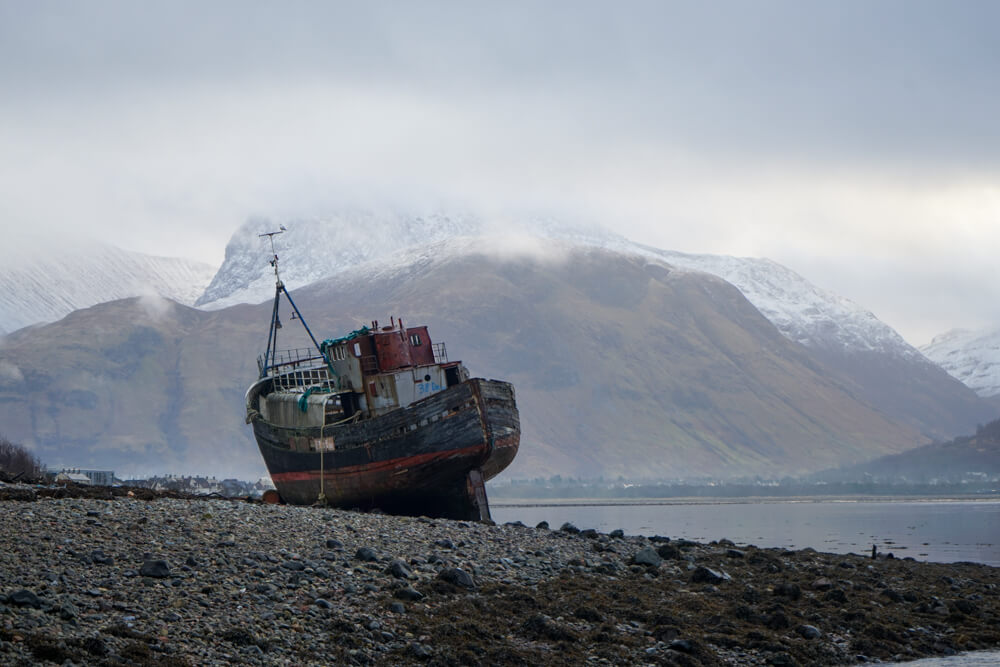
How to Prepare for Your Trip to Scotland
Before you head off to Banavie and the highlands of Scotland, there are a number of things you will need to organise to ensure a smooth and enjoyable trip. This includes where to stay, what to pack and what is the best travel insurance for Scotland, all of which is discussed in detail below.
Where to Stay in Scotland
To access Banavie, as well as other nearby sights such as Castle Stalker, Bridge of Orchy and Eilean Donan Castle, a good base camp will be the town of Fort William. This is a pretty central location in the western highlands and can reach Banavie in about 10 minutes. These are our top suggestions for Fort William accommodation for all budgets.
Luxury – Offering world-class service on the banks of Loch Linnhe, the beautiful Ardrhu House Hotel sits just south of the town of Fort William. With free bike rentals, free parking and even access to a private beach this hotel have everything you need for a luxurious stay in the Fort William region.
Book your stay at the Ardrhu House Hotel right here.
Mid-range – Just 1-mile from Fort William is the luxurious Ben Nevis Hotel and Leisure Club. This Hotel as a bar, restaurant and free access to the heated swimming pool. It is also within walking distance of the town centre of Fort William, so is perfect if you wish to explore this beautiful part of Scotland.
Book your stay at the Ben Nevis Hotel and Leisure Club right here.
Budget – Situated right beside the beautiful Neptune’s Staircase canal locks, the Chase the Goose Hostel is a perfect budget choice for accommodation. With beautiful views of Ben Nevis, this hostel is within walking distance of the many pubs and restaurants in Fort William’s town centre.
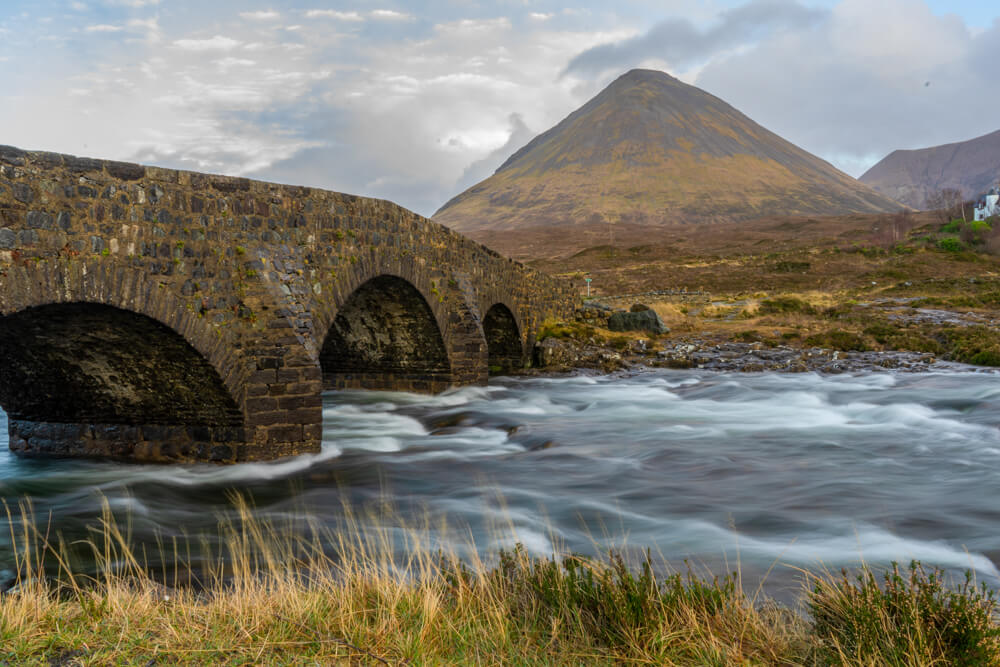
What to Pack for a Trip to Scotland
When it comes to packing for a trip to Scotland there is one item of clothing that you are going to need all year round: a waterproof. It rains in Scotland on average 250 days a year, meaning that during your 5-day Heart 200 road trip you will probably experience at least a drizzle of rain. Due to this, the number one item on any Scotland packing list is a good waterproof jacket.
As for the rest of the year, the temperature in Scotland and the central heartlands is reasonably mild for most of the year. During the winter months, you will most likely experience snow, however, temperatures usually sit around freezing, so it is not too cold. For your reference, the average temperatures in Scotland are listed below during each season.
Spring (March, April, May) – 5-10 degrees C
Summer (June, July, August) – 15 degrees C
Autumn (September, October, November) – 5-10 degrees C
Winter (December, January, February) – 0-5 degrees C
As you can see, the weather never really gets above the teens, with anything over 25 degrees C considered a heatwave. The best way to pack for your trip to the highlands is with layers that can be added and removed as you need them. You will definitely need a hat and gloves during the colder months and will most likely need sunscreen to protect you on the long days in the open.
Given the beautiful sights and scenery that you are no doubt going to see around Scotland, we highly recommend packing a good camera for your trip. If you want to read more about the cameras we use and why we love them, check out the link below.
You can read what else we keep in our camera bag over here.
Photography Equipment
Main Photography Camera – Sony A7 Mirrorless Camera
Main Lens – Sony F3.5-5.6 28mm-70mm
Wide Angle Lens – Sony FE f/2.8 16mm-35mm GM
Camera Stand – Neewer Portable 177cm
Vlogging Camera – Sony HX90v
Action Camera – GoPro Hero 8
Drone Camera – DJI Spark
Camera Bag – Yahan Camera Bag
What is the Best Travel Insurance for Scotland
I know travel insurance is the least enjoyable thing to purchase and look at when you’re planning a trip, however, you wouldn’t want to be without it in the event that something happened. The extortionate medical bills could ruin your trip if you are not covered.
To ensure you have a stress-free trip with no worries about potential medical bills, make sure you cover yourself when you travel. We can recommend using World Nomads, a backpacker-friendly and cheap insurance company that provides good coverage and support.
Get a quote for your travel insurance right here and get covered.
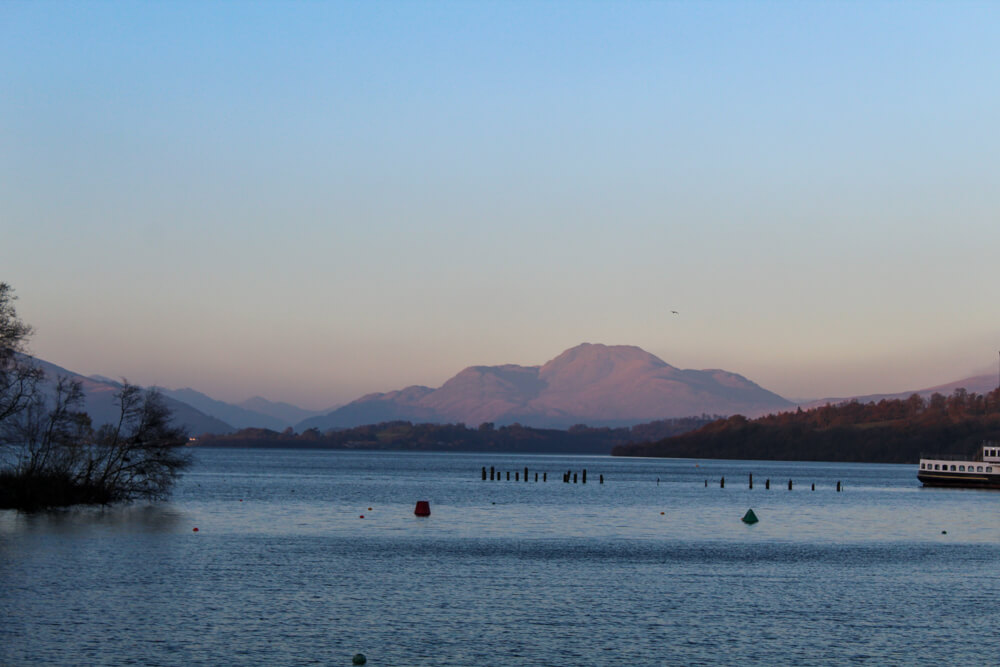
So there you have it, your guide to finding the Neptune’s Staircase. If you are visiting this incredible place and have any other questions on what to expect, leave us a comment down below. We love to chat about this stuff! If you have already been, let us know how it was! Did you have clear skies or moody weather? Let us know in the comments below!
Also, remember to share this with your friends and family that you are going to share this experience with. Sharing is caring and we want to ensure that everyone enjoys their time in this beautiful part of Scotland.
If you are planning a Scotland trip soon then check out our other Scotland content right here. Come and find us on social media to see where we are currently exploring. Tag us in your photos from your bungee jump experience and we will share them with the rest of our community of explorers and backpackers.
Read Now:
- 10-Day Scotland Road Trip Itinerary – Edinburgh, Glasgow and Isle of Skye
- 7 Amazing Places for Stand-Up Paddle Boarding in West Scotland
- Isle of Skye Itinerary – One Day on the Isle of Skye
This article may contain affiliate links that provide us with a small income. For more information read our Affiliate page.
Save this image to your Budapest Pinterest board for later!
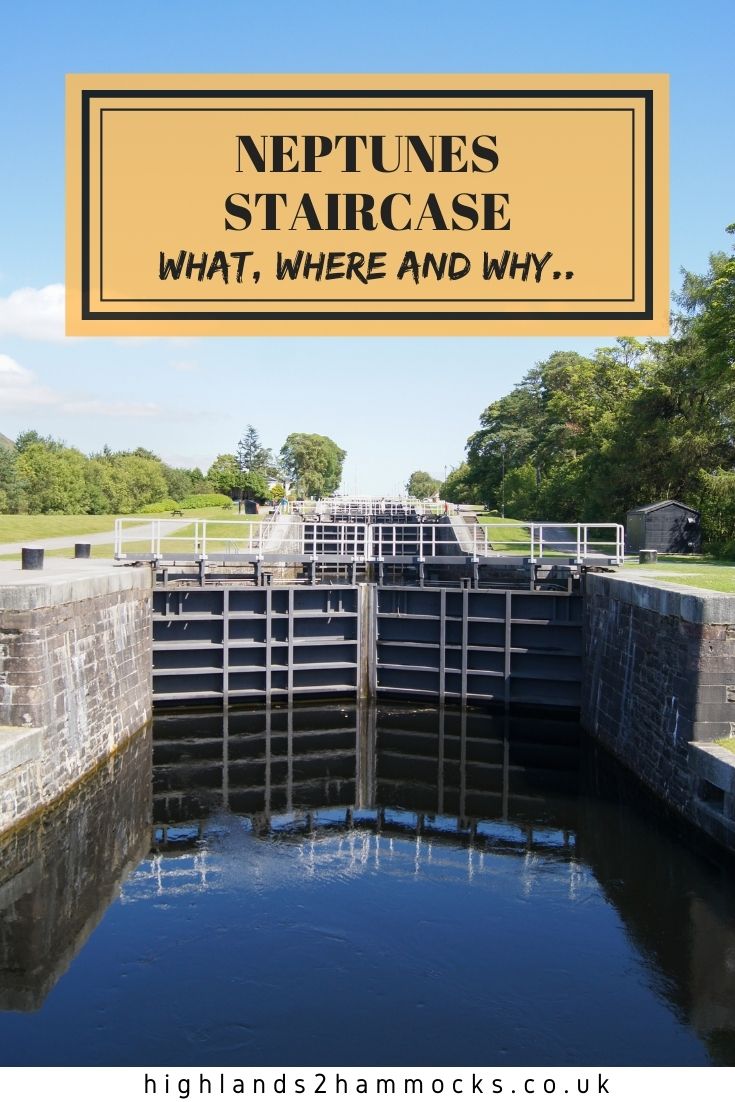
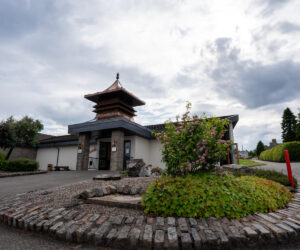
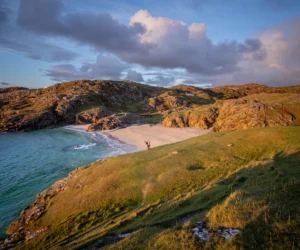
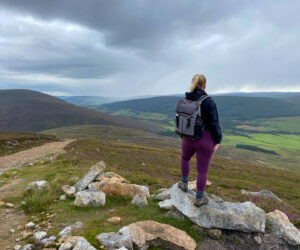
What a fantastic guide to the Neptunes Staircase! Your insights into the history and the stunning photos make me want to visit right away. I never realized how impressive the engineering behind it is. Thank you for sharing such valuable information!
What a fantastic guide to the Neptune’s Staircase! Your detailed insights about the history and the stunning scenery really captured my interest. I can’t wait to visit and experience the beauty of the Caledonian Canal for myself. Thank you for sharing such valuable information!
What a fantastic guide to the Neptunes Staircase! Your detailed explanations and beautiful imagery really bring this stunning location to life. I can’t wait to visit and experience the breathtaking views and the history behind it all. Thanks for sharing such valuable insights!
What an informative guide! I had no idea about the history and engineering behind Neptune’s Staircase. The photos are stunning, too! I can’t wait to visit and experience it in person. Thank you for sharing such detailed insights!
What a fantastic guide! The detailed information about the history and engineering of the Neptunes Staircase really brought the experience to life. I can’t wait to visit and see it for myself! Thanks for sharing such valuable insights!
What a fantastic guide! I never knew about the Neptunes Staircase before reading this. The detailed insights into its history and the stunning imagery really captured my attention. Can’t wait to visit and experience this incredible feat of engineering in person! Thank you for sharing!